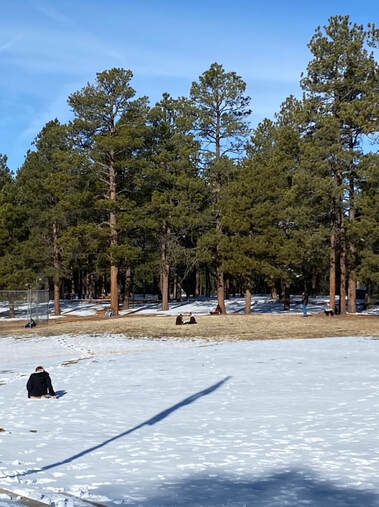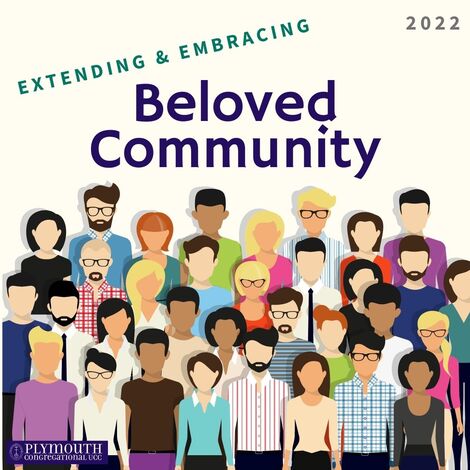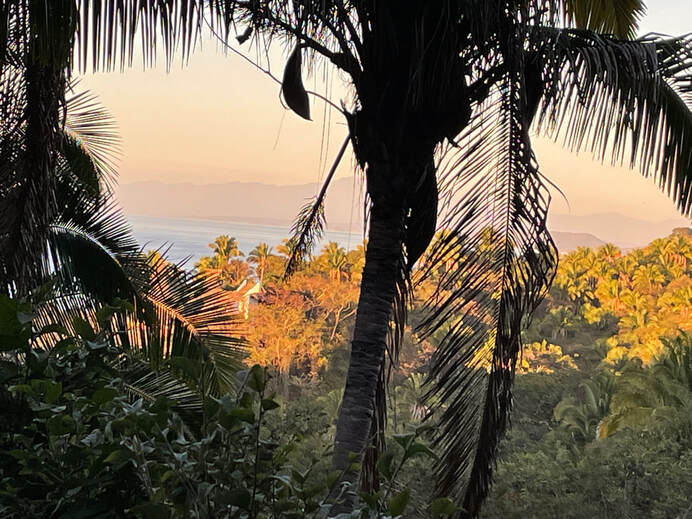|
As I was reflecting on what the theme and goals could be for this year, I kept coming back to the concept of working for the common good. I kept thinking about how our country has moved away from this value, particularly over the past decade or two. Surely, there are people who continue to believe and actively work to make it a reality. Wouldn’t it be nice to hold them up and celebrate their good work? I slowly moved from this phrase to express it a bit differently with Beloved Community, as expressed in our new strategic plan. You might ask as I did, what does beloved community mean and where did this phrase first originate? “Philosopher-theologian Josiah Royce, who founded the Fellowship of Reconciliation, coined the term Beloved Community in the early 20th century. It was Dr. Martin Luther King, Jr., a member of the Fellowship of Reconciliation, who popularized the term and invested it with a deeper meaning. King's Beloved Community is justice, not for any one oppressed group, but for all people. As Dr. King often said, `Injustice anywhere is a threat to justice everywhere.’ He felt that justice could not be parceled out to individuals or groups, but was the birthright of every human being in the Beloved Community.” I can see the connection between working for the common good and beloved community. Therefore, the Leadership Council has adopted the following theme for 2022 - “Extending and Embracing Beloved Community.” What an amazing difference this can make in how we interact with all people and creation. Some will say this is only a dream. They are correct unless we commit to finding the various ways, both individually and corporately, we can breathe life into reality. Leadership Council cannot do this alone. We need all of our church family to be engaged. Let us find ways to celebrate those among us who are putting this dream into action. Please reach out to me or to other Council members with names of groups or individuals we need to recognize and thank for their efforts. Peace and blessings, Claudia 2022 Moderator AuthorClaudia has been a member of Plymouth since 2006. Her volunteer jobs have included Deacon, Congregational Life Board, lead organizer of the All Church Retreat and the Women's Friendship annual retreat, and an active member of the Celtic Spirituality group. and Fellowship of the Grape (FOG) group.  The theme of this year’s Spring Youth Retreat was “Stories.” While retreating in the gorgeous Black Forest, we spent our time focused on learning what it means to co-create our own stories with God, mostly by learning from each other. I had a great time building new and old relationships with other leaders and students across the UCC Rocky Mountain Conference. But on the first night, the camp staff reminded the adult leaders that the weekend was all about the campers first. So with that spirit in mind, I interviewed one of our students for this week’s reflection. I hope you enjoy this perspective as much as I did. Q: What do you want the church to know about the retreat? A: The retreat was so fun and super inclusive. The community and environment was so accepting, and it just felt like one big family. I made new connections right away! I honestly would love to go back. Q: What did you learn? A: The stories shared really gave a different perspective as well. it helped me learn that everyone comes from a different background, but they grow and change. Q: At Plymouth, we call some spiritual or Divine experiences “God sightings.” Did you have any “God sightings” this weekend? A: There was a moment in the chapel when stories were being shared where I genuinely felt the Divine’s/God’s presence. It was very powerful. It was almost like God was being shown through the stories, which made me feel like He was watching and giving people the courage to share their story. Q: Traditionally at La Foret, the older students lead all the younger students in a processional towards the chapel for worship. It’s a deeply reverent walk around the whole campground. Students were carrying flashlights and singing old hymns. What was it like for you to help lead the processional? A: It felt like one big family/community just genuinely connecting with God as well as each other. God’s presence was shown through the songs and connections. It’s hard to explain, but in a way it felt like everyone was at peace, and everyone was thankful to be able to connect with God through each other. Q: What is one big idea you’re taking away from the retreat? A: It is really easy to assume someone’s background story just by looking at them. And even though this is a very human thing to do, that doesn’t make it right. Everyone comes from a different background, but in the end we can always find support through each other and God. Community is very important. If you find one that’s accepting and inclusive, it’s the easiest to find God through it because it opens your eyes and makes you feel like you can have these connections without feeling judged. Instead of assuming, ask questions. It’s important to ask questions within someone’s comfort zone because it can help you really understand them better without assuming where they come from. Brooklyn AuthorBrooklyn is Plymouth's Director of Christian Formation for Children & Youth. Brooklyn has served in local church and student ministries for the past several years. A native of northern Colorado, Brooklyn has professional experience leading in worship, youth, and children’s programs. Read her full bio here. Breathe in, breathe out. Which is better? More necessary? Neither, of course, both are necessary to life. If you try to inhale and hold, what happens? A sensation, a force, shows up that wants something else. The held breath wants a complement, the CO2 buildup inspires a tension, a drive of energy to exhale it, to complement the inhale. I’ve used this breathing cycle illustration in my preaching recently and will again this Sunday. It is simply the best teaching tool that I know of for connecting people with the basic truth of polarities. Gestalt therapist Barry Johnson is credited with originating a systemic lens called polarity thinking that tracks the principle of complementarity. It’s a systemic view that helps us see the plot of the story of a person, a relationship, or a collective in terms of poles and to then move the story in the direction of an integration of poles that generates vitality and health. Polarities are simply the base interdependent energies or values in a given issue or system. Like the inhale and exhale, they do not resolve and are not "either/or" choices. Polarity thinking involves "both/and" thinking in an attempt to create a virtuous cycle (inhale and exhale) where both energies are leveraged for the greater goal (adequate oxygen + lowered CO2 = vitality). When a pole (value) is neglected and feared while its opposite is idolized and inflated, you have a polarization that leads to a vicious cycle. For example, if the common good and shared responsibility are always pejoratively called “communist” and individual freedom and choice are always seen as pure and good (like the political organization Freedom Works does), the outcome will be a vicious cycle that leads to diminished resources for most (and eventually all) in a disorganized and/or dog-eat-dog world. The opposite, of having only conformity and the collective, will also produce a vicious cycle. We need both freedom and responsibility, both the individual and the group. It is always a matter of AND, never "versus." This pole AND that pole in search of a virtuous cycle. Why share about this? Because solutions to our personal and collective struggles rarely come from neglecting or demonizing one of the poles or values. Because when we see others, ourselves, and collectives from this point of view, we can see them more compassionately and creatively as we see them trying to meet their needs or express their values, but tragically and painfully excluding something out of fear and shadow projection. Polarization is a sign of a system poorly and painfully meeting its needs through exclusion. I believe the Good News of the Gospel is profoundly inclusive. The truth that sets us free and that fills us to the brim (our Lenten theme) is a truth that integrates energies, poles, and values for the purposes of Life. See if in your Lenten reflections about missing the mark in your life, in our church, or in our nation if there might be an active polarization with a dominant pole and a demonized or neglected pole. JT AuthorThe Rev. JT Smiedendorf has been a UCC minister since 2001, serving churches in Oregon, Colorado, Wyoming, and Washington. He has a particular passion for reclaiming the earthy, embodied, and experiential aspect of Christian spiritual practice. He and his wife Allison are co-founders of The Sanctuary for Sacred Union, an inter-spiritual initiative, and he is currently earning a postgraduate Certificate in Psychedelic Therapies and Research. Read more about JT here. Better is one hand full of quietness than two hands full of toil and a striving after wind. Ecclesiastes 4:6 Hello, Friends! It’s good to be back among you after two months of sabbath time rest. Thank you for the warm welcome in worship this past Sunday. What a joy to be together after another pandemic hiatus in live-streaming land! My favorite part was greeting the children up front during Children’s Time. I pray we can continue to come back together in person in “old, normal and familiar” ways, as well as many creative, new ways in the coming months. Many of you asked on Sunday, “How was your time away? Are you feeling more rested? Where did you go? What did you do?” Here are some answers…Yes, I am feeling more rested and rejuvenated. And my hope is that I have developed some new habits for incorporating Sabbath rest into working life. It took me time to slow down my body to soul speed. In January I was in Fort Collins, resting at home, due to the pandemic and to the kind of rest I needed. I read books, novels and non-fiction, that I had been hoping to read. Three of them were for the Spiritual Direction training that I started in November: Let Your Life Speak by Parker Palmer, The Discerning Heart, by Wilkie and Noreen Au, Owning Your Own Shadow, by Jungian analyst, Robert Johnson. I highly recommend all of them and each of them would make a good Plymouth adult book study. I watched all the Harry Potter movies again and some fun TV series. I took many naps. I did as much yoga as I could with online helps since it did not feel safe to be at the gym. I did a lot of reflection – on my own and with therapists and my spiritual director. I journaled a lot about the past five or so years of my life, dealing with the challenges of my beloved’s cancer journey and the loss of my son, Colin, to suicide in 2018. By February, I felt rested enough to travel and the covid numbers were starting to go down. I spent six beautiful days on a yoga retreat with other Fort Collin’s women at the Trailwinds Eco-Lodge just outside San Francisco (“San Pancho”), Mexico, about an hour north of Puerto Vallarta. This exquisite place is situated in the jungle on the side of mountains that go down to the beach and the Bay of Banderas. The accommodations are partially open-air. Under my mosquito net, I drifted off to sleep to the sound of the waves, the insects, and the wind in the palm trees. During the day we swam, did yoga in a palapa overlooking the beach, sailed and whale watched and enjoyed each other’s company. It was definitely a wonderful break. I returned to the snow of Colorado for three days then headed to Guilford, CT and New York City to visit with my “sister” friend, Tina, my sister and brother-in-law, Julia and Jerome, and my son, Dylan for six days. This time was very precious. I had not seen my friend and sister for over two years or Dylan’s new brownstone apartment in Brooklyn. Lots of visiting, some museum and movie time just being together. Once again to Colorado in snow, just in time to be in Denver on 2/22/22, for the celebration of the mini-documentary on the Meow Wolf Denver installation that my son, Colin, and his friend, Pepe Apentanco, designed before Colin’s death. In the worst of the pandemic (late 2020 through fall of 2021) Pepe and many of Colin’s friends in the Denver DIY art community made, “Aquakota,” a nightclub run by alien space lemurs and featuring Colin’s best dance music, a work of art! 222 was Colin’s favorite number. It signified to him movement and getting things, art, done and out in the community. Thus we celebrated in the installation space on that auspicious day, 2/22/22, with a concert by two of Colin’s music colleagues, Ben Donehower and David Castillo. If you go to Meow Wolf in Denver (and I suggest you do! You have never seen an art installation quite like Meow Wolf!) check out “Aquakota” on C Street. It’s down the little alley next door to the movie theater. You can find the Westword article from 2/21/22 that launched the mini-documentary here. After all of that excitement, I came back to Fort Collins for more snow and painting the family room in our house as a way of returning to a work schedule! LOL! I had a lot of good fun, some very meaningful times with dear ones, and good rest. As I think back, did I learn anything to share from my sabbatical time? I learned it took much longer than I thought to unwind, to be rid of the “shoulds.” Early in January, I found myself asking daily, sometimes more than once a day, “Shouldn’t I be doing something productive?” This prompted the more important soul question, “Well, what is ‘productive?’ Is productive getting all the tasks that I have assigned to myself for this day done in record time so I can do even more? Is productive meeting everyone else’s needs before I find time to meet my own call of the soul? Is productive being so busy you don’t notice how the snow is falling so beautifully or how the dog is rejoicing, literally jumping and racing and rolling, in the falling snow?” What I learned – what I am continuing to learn, for learning is practicing ¬– is to remind myself to move a little slower through life so that I can take in moments that I often raced through with anxiety. God is in these quiet, connective moments. As our Lenten devotional poet tells us in her poem, From Here in the Sand,* God stands with us in all moments, the relaxed oasis moments and the fiercest sandstorm moments of the desert wilderness called Life. God has been there all along, way before we got to any of our moments. And God stands with us singing songs of water in the desert even during the most stinging winds. I invite you to find some Sabbath moments with God this Lent whether life is coming to you gently like a breeze through palm trees or like the blast of a storm. God is with you in all moments, inviting you to notice the wonder and/or bleakness of the scenery. Inviting you to notice God’s steadfast presence as the fleeting glimpse of an exotic butterfly or a long drink of cold water. Don’t let the “shoulds” of life overtake you! Notice who you are in God’s presence, where you are, and what gifts are being given in every moment. Blessings and with you on the journey, *Rev. Sarah Speed | A Sanctified Art LLC | sanctifiedart.org AuthorThe Rev. Jane Anne Ferguson, Associate Minister, is a writer, storyteller, and contributor to Feasting on the Word, a popular biblical commentary. She is also the writer of sermon-stories.com, a lectionary-based story-commentary series. Dear Plymouth Family,
For many, many months, I have been waiting to write this letter containing joyous news from the Pandemic Team: We are taking another great step forward as a congregation in liberalizing pandemic restrictions! This takes effect tomorrow. Covid numbers in Larimer County have fallen precipitously (see above), and the Pandemic Team feels that it is time for us to move to a mask-friendly (or mask optional) stance. CSU also lifted its mask mandate this week. At Plymouth, this means that if you feel comfortable coming to church in a mask, that’s great! If you are alright being unmasked, that’s great! The lovely blue tape that marked off every other pew will also be removed! Many of the things we took for granted two years ago (singing from hymnals, passing friendship pads and offering plates, greeting the ministers after worship, standing within six feet of another human being, hearing our choir and seeing their faces, having potlucks and meals together, welcoming outside groups into the church) will all be resumed with immediate effect. (Note that we will not offer nursery care for the time being.) What have you learned in the past two years not to take for granted? A hug with a dear friend? A glass of wine at FOG? A friendly word offered to a guest at Plymouth? Hearing an entire congregation sing a favorite hymn? Sitting in the pew that you think of as yours? Seeing another worshiper face to face? Receiving communion face to face from a minister and a deacon? Hearing the small voices of our youngest UCCers coming forward for Children’s Time? It's time to reacquaint yourself with those joys! My invitation to you is to come on back! The science is with us, and if you wish to wear a mask, please do so! (The clergy will be masked when not speaking.) And if you really feel more comfortable continuing to livestream, know that we love you and respect that decision: that’s why it’s available! On March 2, 2020, our Pandemic Team had its first meeting. At that time none of us would have guessed that it would be almost exactly two years before we would resume a sense of normalcy because of Covid. I am grateful for the expertise, patience, and wisdom of this group, which has guided us each step of the way. I am part of a CREDO group of four UCC clergy in Colorado, Connecticut, California, and Maryland. Our is the only one of those three churches not to have had members die from Covid-related causes, and our Pandemic Team is part of the reason. If you see any of them at church, a word of appreciation would not go amiss.
I give thanks to God for medical breakthroughs in the past two years. …for the patience of our members and friends. …for the faithfulness of volunteers who continued to go above and beyond. …for staff colleagues who have been through hell together. …for lay leaders who have been willing to make unpopular decisions. …for your faith in God to see us through. As the chancel choir anthem says, “God has work for us to do!” Let’s get at it! See you in church! What does it feel like to be alone? Sometimes it’s a relief and sometimes it’s not. Many of us have known that all too well during the two years of pandemic. None of us asked for this time by ourselves or with a circle of a few other people. For some of us, loneliness has been emotionally devastating. At various points in the past two years, we’ve been deprived of seeing family, worshiping with others at Plymouth, sharing a hug with a friend. At last Sunday’s first face-to-face services the feeling of joy at being back together in worship was palpable. It is so different to celebrate communion together with others in the same room, to have kids come forward for the time with children, to preach to human beings in the pews, rather than the one eye of the video camera. And it was great to catch up with people at coffee hour and in the adult ed. forum! What was it like for you if you joined us in person? See an old friend? Make a new one? Greet some of the visitors we had at each service? Experience the collective voice of singing a hymn? None of us knows what the future holds in terms of the behavior of Covid, but for now, I think we should live and worship with gusto. The musical term “con brio” means with spirit or with vigor, and that’s how I plan to walk through Lent this year, relishing the presence of our congregation in worship. I’m also aware the Lent can be a time for sabbath, for resting in God. I wonder…are there ways of sabbath that can be done “con brio?” We are using a Lenten devotional and worship materials called “Filled to the Brim,” which seems a little counterintuitive for the way most of us observe this season that is meant to help us deepen our faith. Some of us see Lent as a lead-in to Good Friday and Jesus’ self-sacrifice on the cross, but there is another way to view this 40-day season. Jesus spent 40 days alone in the wilderness on something like a vison quest that prepared him for his brief and incredibly influential ministry. What if we approach Lent as a time in the wilderness when we are challenged to go a bit deeper in our faith than we usually do? Maybe do a few things (or refrain from doing things) that stretch us slightly out of our comfort zones? What might that mean for you? Using the Lenten devotional booklet? Attending worship every Sunday? Finding a few more minutes each day to spend in prayer and contemplation? Stretching to do something for another person, even someone you don’t know? I wonder if as we reflect on Jesus’ forty days of wilderness wandering — alone — if we might find inspiration to work with the images of aloneness and companionship during Lent. How might our intention of spending time intentionally be a form of sabbath? What if we embrace where we are right now with enthusiasm and come back together as a community of faith? What changes might be possible in the way you approach and live your faith? What if we can find sabbath in our togetherness? Lent is a season full of possibility. May it be fruitful for you! Shalom! AuthorThe Rev. Hal Chorpenning has been Plymouth's senior minister since 2002. Before that, he was associate conference minister with the Connecticut Conference of the UCC. A grant from the Lilly Endowment enabled him to study Celtic Christianity in the UK and Ireland. Prior to ordained ministry, Hal had a business in corporate communications. Read more about Hal here. |
Details
|








 RSS Feed
RSS Feed